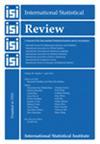Optimal Treatment Regimes: A Review and Empirical Comparison
IF 1.8
3区 数学
Q1 STATISTICS & PROBABILITY
引用次数: 3
Abstract
A treatment regime is a sequence of decision rules, one per decision point, that maps accumulated patient information to a recommended intervention. An optimal treatment regime maximises expected cumulative utility if applied to select interventions in a population of interest. As a treatment regime seeks to improve the quality of healthcare by individualising treatment, it can be viewed as an approach to formalising precision medicine. Increased interest and investment in precision medicine has led to a surge of methodological research focusing on estimation and evaluation of optimal treatment regimes from observational and/or randomised studies. These methods are becoming commonplace in biomedical research, although guidance about how to choose among existing methods in practice has been somewhat limited. The purpose of this review is to describe some of the most commonly used methods for estimation of an optimal treatment regime, and to compare these estimators in a series of simulation experiments and applications to real data. The results of these simulations along with the theoretical/methodological properties of these estimators are used to form recommendations for applied researchers.最佳治疗方案:综述与实证比较
本文章由计算机程序翻译,如有差异,请以英文原文为准。
求助全文
约1分钟内获得全文
求助全文
来源期刊

International Statistical Review
数学-统计学与概率论
CiteScore
4.30
自引率
5.00%
发文量
52
审稿时长
>12 weeks
期刊介绍:
International Statistical Review is the flagship journal of the International Statistical Institute (ISI) and of its family of Associations. It publishes papers of broad and general interest in statistics and probability. The term Review is to be interpreted broadly. The types of papers that are suitable for publication include (but are not limited to) the following: reviews/surveys of significant developments in theory, methodology, statistical computing and graphics, statistical education, and application areas; tutorials on important topics; expository papers on emerging areas of research or application; papers describing new developments and/or challenges in relevant areas; papers addressing foundational issues; papers on the history of statistics and probability; white papers on topics of importance to the profession or society; and historical assessment of seminal papers in the field and their impact.
 求助内容:
求助内容: 应助结果提醒方式:
应助结果提醒方式:


